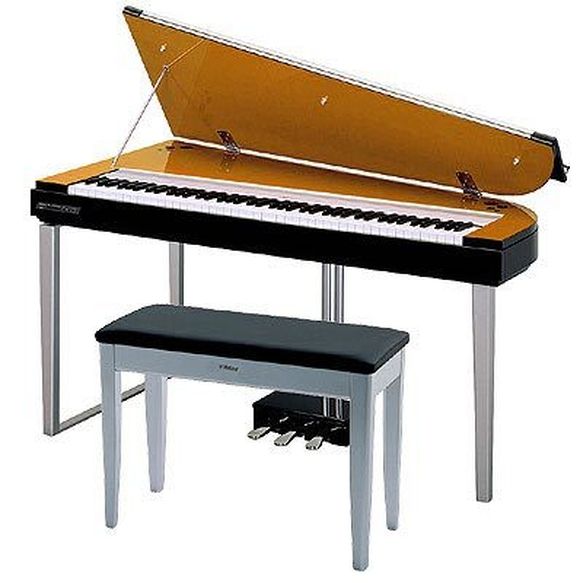6. Amplification
As we address this subject, we enter a realm that for a long time was the nightmare of keyboard players. Electronic keyboards of all kinds are high-fidelity instruments, producing sounds rich in subtle tonality, and by the time their electronic signals had been processed by a mixer, sucked in and regurgitated by an amplifier and walloped into the air by a speaker, the original sound was sometimes mangled beyond all recognition. Fortunately, modern PA systems are capable of good quality reproduction across the frequency spectrum, although there are still plenty of poor ones around.
The problem above is largely reserved for gigging musicians however. When buying a digital piano for home use, the amplifier and speakers built-in to the instrument will usually be perfectly adequate, and in higher-priced models, they should be excellent.
In all cases, a key issue is volume - how loud do you need your piano to be? For home use, the built-in system should be fine. In a band, or for a large venue though, youll need to consider some form of additional amplification. The rule once again is that you tend to get what you pay for, but choose with care - even at the highest professional levels, you can hear some less than pleasant keyboard sounds, regardless of how good the rest of the band sounds.

Yamaha MODUS H01 - AG
Our Amplification Online Advisor carries more detail, but for now, consider the following key points:
- Choose your speakers with great care. The problem with keyboards is the frequency range they produce - from very high, to very low, with every shade in between. Ideally, you would have a pair of full-range 12 speakers and at least one subwoofer - in effect, your own PA system. As this is usually impractical however, check the frequency response of your speakers, and go for as broad a range as possible.
- If not using powered or active loudspeakers, go for a good stereo power amp - at least 200 Watts RMS - and ensure it is rated higher than the speakers so you have plenty of headroom. The aim is to get the volume you need without distortion, and a full, rich sound even at low levels.
- Specialist combo amps are available which are designed to accommodate the particular needs of keyboards. However, if you want to make the most of the stereo digital technology in your piano, you really need a pair of combos, set either side of the stage or room.
- If youre using your piano with another keyboard or two, consider investing in your own small mixer so you can send a single stereo signal to the main PA. In this scenario, a combo can be useful as an on-stage monitor.
Where you are not having to compete with the sound of a band or orchestra, a reasonably powerful hi-fi system can be a good way of amplifying a digital piano, especially when there are no speakers built-in to the piano itself. Of course, most models are equipped with headphone sockets so you can play away quietly, with only the sound of the keys to disturb those around you. As always with headphones, make sure you dont have the sound too loud, and give yourself regular breaks. Prolonged exposure even to low volumes at close range can be as damaging as short excessively loud sounds.



